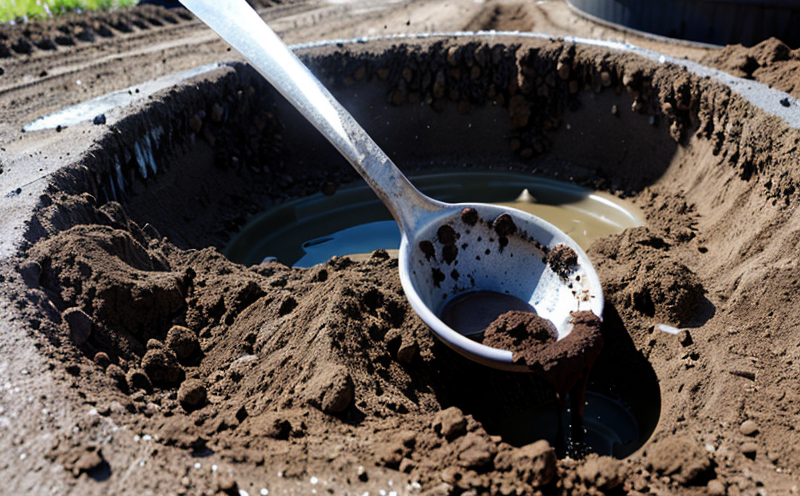ASTM D2976 Volatile Solids Content in Sludge Test
The ASTM D2976 standard test method is widely recognized as a critical tool for determining the volatile solids content (VSC) of sludge and biosolids. This parameter is essential for wastewater treatment facilities, waste management companies, and environmental consulting firms to ensure compliance with regulatory standards and optimize operational efficiency.
The VSC measurement provides insight into the organic matter present in the sludge, which directly impacts the facility's carbon footprint and energy consumption. By accurately quantifying the volatile solids content, operators can better manage their resources, reduce waste disposal costs, and enhance overall sustainability practices. This test is particularly important for facilities that must adhere to strict environmental regulations regarding sludge management.
The process involves drying a sample of the sludge at 50°C until all moisture evaporates, then incinerating it at 600°C to burn off organic compounds. The difference in mass between these two stages represents the volatile solids content, which is expressed as a percentage by weight.
This test method plays a crucial role in the wastewater treatment industry, supporting decisions regarding sludge disposal and reuse options. For example, facilities may choose to use biosolids for agricultural applications or landfill cover if they meet certain VSC thresholds. Understanding the volatile solids content allows operators to make informed choices that align with both regulatory requirements and business goals.
In addition to compliance, accurate VSC testing can help optimize treatment processes by identifying areas where improvements are needed. By tracking changes in VSC over time, facilities can fine-tune their operations to maximize resource recovery while minimizing environmental impact. This data is also valuable for R&D teams working on innovative solutions for sludge management and biosolids utilization.
The ASTM D2976 test has been adopted by numerous regulatory bodies worldwide, including the Environmental Protection Agency (EPA) in the United States. Its reliability and consistency make it a preferred choice for laboratories around the globe. By adhering to this standard, facilities ensure that their results are comparable and acceptable across different jurisdictions.
Understanding the implications of VSC testing goes beyond mere compliance; it represents an opportunity for facilities to contribute positively to environmental sustainability. By reducing waste sent to landfills and promoting the responsible use of biosolids, these facilities play a crucial role in mitigating climate change and preserving natural resources.
Applied Standards
- American Society for Testing and Materials (ASTM) D2976-18 Standard Test Method for Volatile Solids Content of Sludge or Biosolids
- Environmental Protection Agency (EPA) Guidelines for Sludge Management
- ISO 15806:2014 Waste and Biomass Valorization — Determination of Organic Matter in Sewage Sludge
The ASTM D2976-18 standard is the cornerstone of this testing procedure, providing clear instructions for sample preparation, drying conditions, incineration steps, and calculation methods. It ensures that all laboratories performing VSC tests follow consistent protocols, leading to reliable and reproducible results.
Compliance with ASTM D2976 is particularly important given the stringent regulations governing wastewater treatment operations. Many countries have adopted or adapted this standard into their national guidelines for sludge management. For instance, the EPA's guidelines for sludge management emphasize the importance of accurate VSC testing in determining appropriate disposal methods and reuse options.
Additionally, ISO 15806 provides supplementary information on the determination of organic matter in sewage sludge, offering a broader context within international standards. This standard complements ASTM D2976 by addressing additional parameters such as total solids content, ash content, and biodegradability.
The combination of these standards ensures that laboratories conducting VSC tests adhere to the highest levels of accuracy and precision. By following these guidelines, facilities can trust in the reliability of their test results and ensure compliance with both local and international regulations.
Customer Impact and Satisfaction
Accurate VSC testing is essential for ensuring that wastewater treatment facilities operate efficiently and sustainably. By providing precise measurements, this service enables customers to make informed decisions about their sludge management practices.
For quality managers and compliance officers, the ability to rely on consistent and accurate test results allows them to meet regulatory requirements confidently. This reduces the risk of costly penalties or operational disruptions due to non-compliance.
R&D engineers benefit from this service by gaining valuable insights into their processes that can lead to process improvements and innovations in biosolids utilization. They can use the data obtained from VSC tests to refine treatment methods, optimize energy consumption, and explore new applications for biosolids.
Procurement teams also find value in this service as it helps them select reliable partners and suppliers who adhere to high-quality standards. By partnering with laboratories that provide accurate VSC testing, procurement officers can ensure that their facilities receive consistent and dependable sludge management solutions.
The satisfaction of customers extends beyond mere compliance; it encompasses the broader goal of environmental stewardship. By offering this service, we contribute to a more sustainable future by helping our clients reduce waste, minimize energy consumption, and promote responsible resource use.
Environmental and Sustainability Contributions
- Sustainable Resource Management: By accurately measuring VSC, facilities can better manage their sludge resources, ensuring that they are used efficiently and responsibly.
- Emission Reduction: Precise VSC testing allows for the optimization of treatment processes, leading to reduced greenhouse gas emissions from wastewater treatment operations.
- Resource Recovery: Understanding VSC helps facilities identify opportunities to recover valuable resources from sludge, such as nutrients and organic compounds.
- Waste Minimization: Accurate testing supports decisions regarding waste disposal, enabling facilities to minimize the amount of sludge sent to landfills.
The ASTM D2976 Volatile Solids Content test is not just a compliance tool; it is a key component in fostering environmental stewardship and sustainable practices. By adhering to this standard, laboratories contribute to a more responsible approach to resource management and waste disposal.





